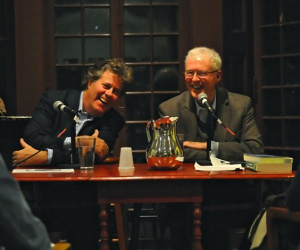Pulitzer Prize-winning writer discusses journalism
The Daily Pennsylvanian
November 14, 2011

-
David Maraniss and Paul Hendrickson, left to right, at the Kelly Writers House Monday night.
(Ciara Stein, DP Staff Photographer)
Pulitzer-Prize winning journalist and author David Maraniss told audience members at the Kelly Writer's House on Monday that he gets the thrills when he writes the perfect sentence.
Maraniss, associate editor at The Washington Post, spoke about his experience with non-fiction writing.
English professor Paul Hendrickson, who worked alongside Maraniss as a features writer at the Post, introduced Maraniss. "The only thing that matches the grace of his prose is the decency of his person," he said.
Maraniss opened the discussion with his upcoming book, a biography on President Barack Obama. "The only hard part of this book was deciding whether to do it," he said. "I realized though, that the pursuit of the truth and of the story is in itself a worthy cause."
He also touched upon his love for sports writing. "It's a way to get away from the whole Washington political scene. Some people don’t take sports writing too seriously, but the truth is—a lot of politics is utterly trivial, and a lot of sports have deep meaning."
Hendrickson then asked Maraniss to read aloud from one of his more iconic news pieces—a four-page story on Sept. 11 published Sept. 16, 2001 on the front page of The Post. "There were reams of copy being funneled in—reporting going on everywhere by very talented journalists," said Maraniss, speaking about the challenges of writing this particular piece. "Once again, I tried to center the piece on a universal theme: the idea that our life is ordinary, until it's not."
Maraniss also briefly discussed ethical dilemmas inherent in journalism. He recounted an incident in which a lieutenant during the Vietnam War was only willing to talk to him if he were "good to his boys," referring to the soldiers who served under him. "I told him I couldn't do it. I told him I would try to do the best reporting possible, but I couldn't make that promise."
The audience appreciated Maraniss' expertise. "It was great to hear a professional talk about his line of work and become eloquent on all the stories he had to share. I was amazed at the depth of research that goes into stories, particularly at the mention of the 4,500 index cards that Maraniss made for a story," College senior Tyler Woods said.
"What was particularly interesting for me to hear was Maraniss' advice that the least important person to talk to when writing a biography is the person upon whom the biography is based," 2011 College graduate Kristen Martinsaid.
